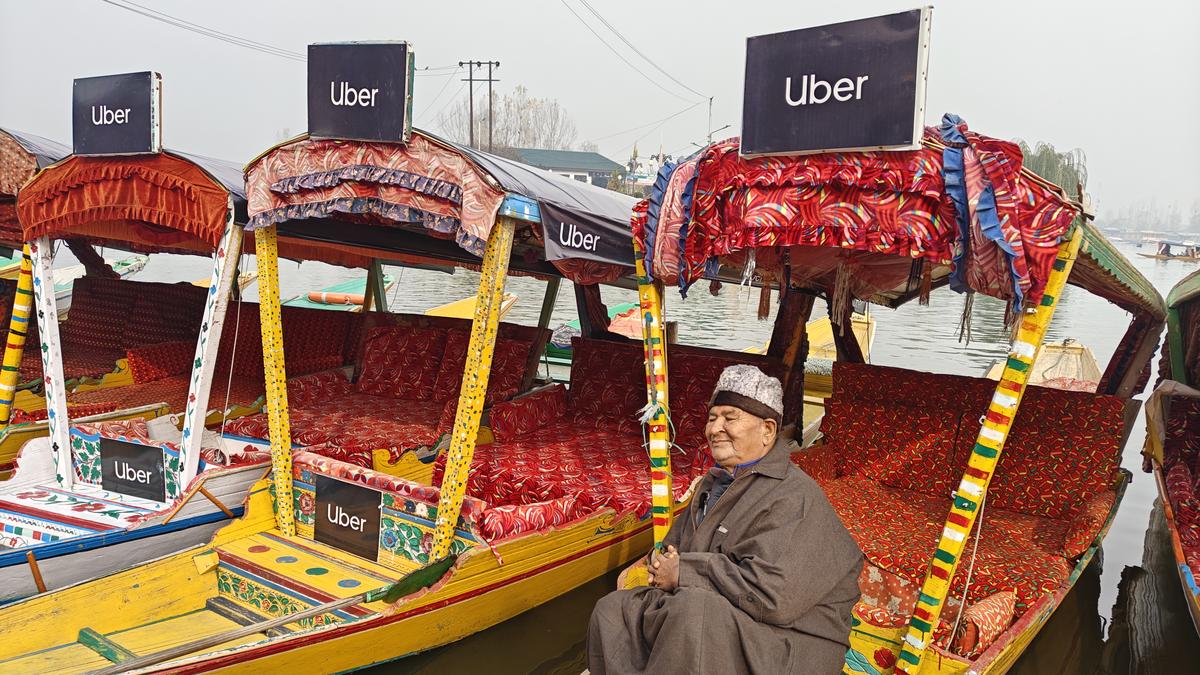
A bribe for the ferryman: What Uber’s latest venture in Kashmir means for shikhara owners in Srinagar Premium
The Hindu
Discover the fusion of old-world charm and new-age convenience with Uber's partnership in Kashmir's iconic Dal Lake.
On a crisp November morning, the Dal Lake glimmers with a liquid mercury under the muted winter sun. Spade-shaped paddles cut through the icy waters and the soft cadence of a phiran-draped gondolier, clutching kangris and narrating folklore make the shikara as Kashmiri as kahwa or zafraan. Amid the ornate boats moored along the ghats, with their floral cushions and hand-painted flourishes, there it is — perched somewhat incongruously on the prow — a sleek black-and-white logo that city dwellers know all too well: Uber.
It is, perhaps, the strangest of partnerships — a fusion of old-world charm and new-age convenience — that the ancient trade of the gondolier is yoked to the efficiency of the algorithm. Just as Charon ferried souls through the frigid Styx, the shikara now carries visitors through the murky depths of a region caught between past and future, between tourist boom and political discord.
As part of its expansion in the region, the ride-hailing giant has ventured into Kashmiri waters, offering tourists the ability to book shikara rides with a few swipes. Born out of a partnership between Uber and the Shikara Union the initiative is being pitched as a win-win: For tourists, the appeal is obvious. No more haggling, no more being guilt-tripped into buying overpriced saffron or papier-mâché trinkets. Just an easy, app-based transaction where the price is set, the route is clear, and the shikara operators are vetted by Uber. A ride that might have cost a clueless firangi ₹5,000 after hard negotiations can now be booked online for the fixed rate of ₹800 per hour.
For shikara operators on the other hand, it provides predictability in an uncertain economic climate and the elimination of middle-men. But the move also highlights a deeper tension in a place where change is often viewed with wary eyes — what does it really mean to inject tech-driven expedience into a land where time itself seems to move with caution?
The sprawling lake, often dubbed the “jewel in the crown of Kashmir”, has always been more than just a tourist hub. It feels like a microcosm of the region itself: breathtakingly beautiful, endlessly romanticised, and constantly embroiled in contrast.
A decade ago, the waters reflected a different reality — frequent shutdowns, protests, and a disconcerting quiet interrupted only by the sounds of military convoys. The region’s special status under Article 370 had been revoked in 2019, and promises of development and prosperity hung in the air like unanswered prayers. Today, the checkpoints remain, as do the soldiers, but the narrative has (slightly) shifted. Tourism is booming, and with it comes the sheen of progress.
For most, the Uber Shikara service is a pragmatic response to a booming tourism sector. The pandemic-induced lull gave way to a surge of domestic and international visitors, eager to experience the Dal’s famed waters. But with this boom came logistical challenges: overcrowded boulevards, overbooked houseboats, and an overwhelmed fleet of shikaras.













